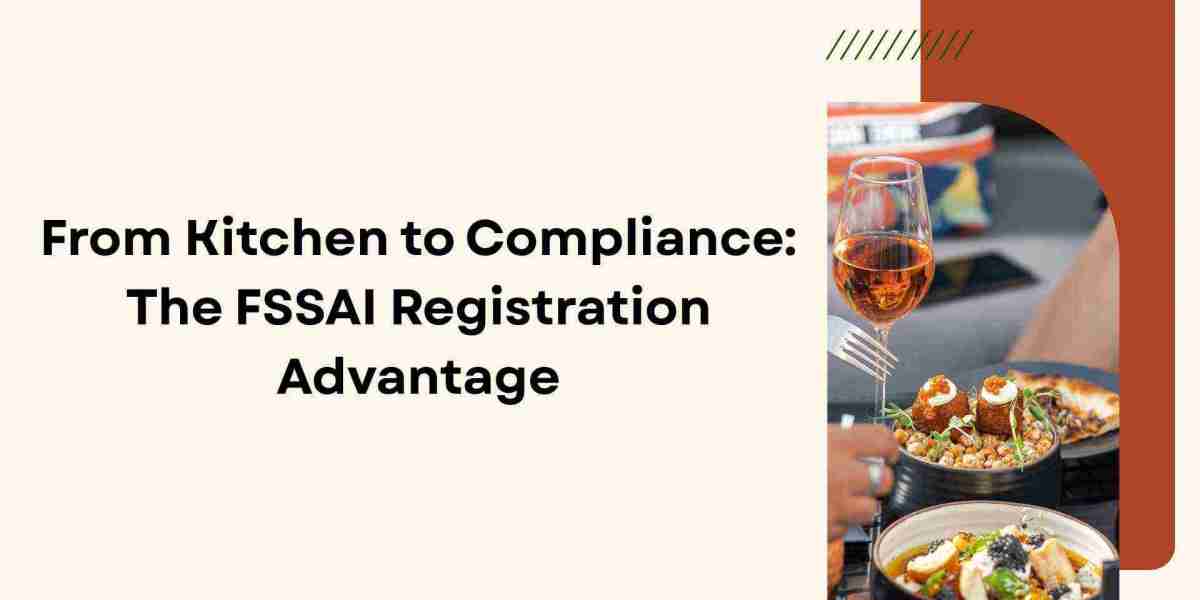Introduction
In the rapidly growing food industry of India, maintaining hygiene, quality, and legal compliance is no longer optional; it’s essential. Whether you're running a small home-based kitchen or a large food processing unit, FSSAI Registration is your gateway to building a trustworthy, legally compliant food business. It assures consumers that what they eat is safe, clean, and prepared under national standards. From small food vendors to global food chains, the Food Safety and Standards Authority of India (FSSAI) plays a pivotal role in overseeing and regulating the quality of food products. This blog explores the journey of food businesses from the kitchen to compliance, highlighting the advantages of FSSAI registration and why it is a game-changer for entrepreneurs in the food sector.
What Is FSSAI and Why Does It Matter?
FSSAI, short for the Food Safety and Standards Authority of India, is the regulatory body under the Ministry of Health & Family Welfare. It is responsible for setting food safety standards, licensing, inspection, and enforcement. Any food business operator (FBO) in India—be it a cloud kitchen, restaurant, home chef, food truck, packaging unit, or wholesaler—is required to register with FSSAI or obtain a license, depending on the size and turnover of their operations.
Why does it matter?
- It ensures food is safe for consumption.
- It builds trust with customers.
- It’s mandatory under Indian law for all food businesses.
- It helps prevent penalties, closures, or legal action.
Who Needs FSSAI Registration?
The FSSAI mandates that all entities involved in the production, processing, distribution, and sale of food products must obtain a registration or license. This includes:
- Home-based food sellers or caterers
- Restaurants and cafes
- Packaged food manufacturers
- Cloud kitchens and tiffin services
- Street food vendors
- Food transporters and warehouses
- Online food delivery partners (like Swiggy, Zomato sellers)
Whether you are selling pickles from your home kitchen or managing a franchise of eateries, FSSAI compliance is a must.
Types of FSSAI Licenses
The FSSAI offers three types of licenses based on the size and scope of the business:
- Basic Registration – For small businesses with a turnover of up to ₹12 lakh/year.
- State License – For businesses with a turnover between ₹12 lakh and ₹20 crore/year operating within one state.
- Central License – For large businesses or those involved in import/export with a turnover above ₹20 crore/year.
Choosing the right license is crucial for hassle-free operations and avoiding legal issues.
FSSAI Registration Process: Simple and Online
Registering for an FSSAI license is a straightforward process, mostly completed online:
- Access the FSSAI Registration Portal: Begin by visiting the official FSSAI website dedicated to food license applications.
- Fill Out the Registration Form: Provide all necessary details, including your name, business information, food category, and upload essential documents like your PAN card.
- Review and Submit the Form: Carefully verify all the entered information before submitting your application.
- Pay the Application Fee: Make the online payment based on the type of food license required for your business.
- Verify via OTP: Enter the One-Time Password (OTP) sent to your registered mobile number or email address to validate your application.
- Premises Inspection (If Applicable): An FSSAI official may visit your business location for inspection if required under your license category.
- Receive Your FSSAI License: Once approved, your food license will be issued and made available for download from the portal.
The license is usually valid for 1–5 years and is renewable before expiry.
Key Advantages of FSSAI Registration
Here’s how registering with FSSAI boosts your food business:
1. Builds Consumer Trust
The FSSAI logo on your food packaging or menu signals that your food is safe and government-approved. It gives customers the confidence to buy from you repeatedly.
2. Legal Protection
Operating without an FSSAI license can lead to heavy penalties, product seizures, or even business shutdown. Registration protects your venture and keeps you on the right side of the law.
3. Brand Credibility
A registered food business enjoys a better reputation, especially when scaling up or applying for loans, partnerships, or listing on food aggregator platforms.
4. Expansion and Franchising
FSSAI certification is often required for partnerships, supply contracts, or franchise expansion. It's a basic document in any business growth plan.
5. Better Quality Control
Regular inspections and adherence to FSSAI standards ensure hygiene and quality in your food processing and storage, leading to better customer satisfaction.
6. Eligibility for Government Schemes
Registered food businesses are eligible for benefits under government schemes, subsidies, or grants targeted at MSMEs or startups in the food sector.
What Happens If You Don't Register?
Operating a food business without FSSAI registration is an offense under the FSS Act 2006, and can attract:
- Fines up to ₹5 lakh
- Imprisonment in serious cases
- Closure of business
- Confiscation of stock
Note: You can also apply for Tatkal FSSAI Registration from our website
Conclusion
FSSAI registration is not just a formality, it’s a competitive advantage in today’s food industry. From ensuring consumer safety to building a solid brand, it provides the trust, transparency, and legitimacy that modern customers demand. So, whether you're running a small cloud kitchen, opening a new restaurant, or expanding your packaged food business, start your journey the right way—from kitchen to compliance with FSSAI registration.




